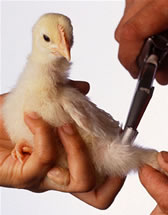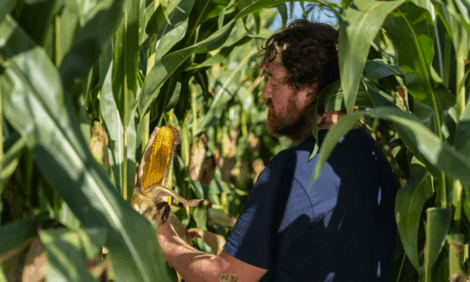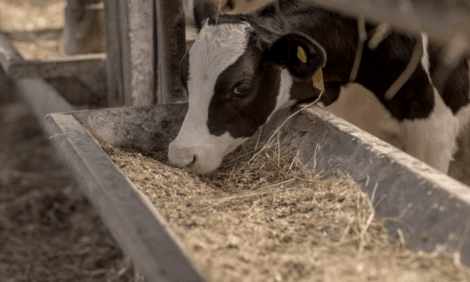



Advances in Immunology - The Best Shot at Disease Prevention
By the USDA's ARS - 2005 was a good year for immunology. That was the year officials at the U.S. Centers for Disease Control and Prevention declared the elimination of rubella in the United States.The eradication of this and other devastating human diseases, such as polio and smallpox, has been due largely to vaccine development and aggressive immunization programs. Today, vaccines have minimized the toll of many pernicious diseases that used to devastate human health, and animals have benefited too.
In the last century, scientists in the Agricultural Research Service (ARS) developed vaccines that helped eradicate hog cholera, which once cost the U.S. swine industry tens of millions of dollars every year. ARS researchers have also developed vaccines for other animal diseases, such as Marek's disease in chickens and enteric septicemia in catfish, reducing animal suffering and enabling the United States to develop one of the world's safest and most efficient animal production systems.
ARS scientists continue to advance the fields of immunology and vaccinology today (see Research Briefs), with research into the mechanisms pathogens use to evade the immune system and discovering pathways that will lead to protective immunity and disease resistance . Researchers have also been instrumental in helping to develop a universal toolkit––comprised of species-specific immunological reagents––to gauge immune responses in agricultural animals.
 |
"At the workshop we established networks, both national and international, to identify the most significant toolkit needs for different species," says National Program Leader Cyril Gay.
The U.S. Veterinary Immune Reagent Network was established to develop these toolkits. With a $2.15 million grant from the U.S. Department of Agriculture's Cooperative State Research, Education and Extension Service, the network has started work on five species: cattle, horses, poultry, swine and fish. Two ARS researchers, Hyun Lillehoj and Joan Lunney, are chairing the chicken and swine efforts, respectively.
The network, whose researchers hail from a variety of government, university and institutional organizations, has made significant progress, and researchers are already in the early stages of developing monoclonal antibodies for use in animal disease and vaccination studies.
Within the United States, more than 1,300 vaccines have been licensed to treat more than 180 animal disease agents. However, despite the benefits that have accompanied the development of molecular vaccines, many challenges remain. More research is required to determine the safety and efficacy of these vaccines and to develop new vaccines for the many diseases that are currently not preventable.
How are the fields of immunology and vaccinology currently developing? How can research improve the current state of these fields, and what can health professionals do to advance that research? Animal and human health professionals from around the world addressed these and other questions at the "Advances in Immunology and Vaccine Discovery EU-US Workshop," held December 12-14 at the ARS National Animal Disease Center in Ames, Iowa.
The USDA co-sponsored the workshop with the Office of Naval Research, the National Science Foundation, the National Institutes of Health, Iowa State University, the Molecular Vaccines Interagency Working Group, and the European Commission Directorate of Research.
Workshop attendees identified and prioritized recommendations for vaccine discovery research. These include making vaccine research a national public health priority, defining critical lists of disease agents that require new or improved vaccines, and further developing molecular vaccine technology.
During the workshop, the attendees identified some of the most serious problems facing immunology today, and developed strategies to address them. If implemented, the recommendations from this meeting will help develop new animal vaccines that could improve animal health, reduce the risk of humans contracting zoonotic diseases, improve food production efficiency and protect U.S. agriculture from foreign animal diseases.
For more information about ARS's immunology and vaccinology research, contact National Program Leader Cyril Gay.
February 2007


